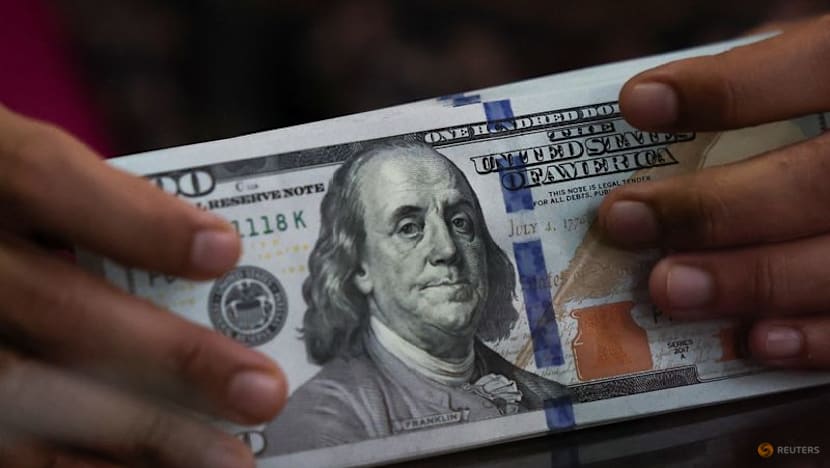US dollar drops as government reopens after record shutdown

An employee holds U.S. dollar bank notes at a money changer in Jakarta, Indonesia, April 9, 2025. REUTERS/Willy Kurniawan
NEW YORK :The U.S. dollar dipped on Thursday as the U.S. government reopened, leaving traders grappling with the long-term impact the shutdown will have on trust in the U.S. currency and ahead of a deluge of data on the health of the economy.
The shutdown was the U.S. government's longest, snarling air traffic, cutting food assistance to low-income Americans and forcing more than 1 million workers to go unpaid for more than a month.
"The shutdown is over, but how soon are we going to go back to normal? How soon are we going to have numbers? How soon am I going to be able to do real, accurate analysis based on trusted American statistics from September and October? That's in doubt," said Juan Perez, director of trading at Monex USA in Washington.
White House economic adviser Kevin Hassett said on Thursday the government would release the closely watched employment report for October, but without the jobless rate because the household survey wasn't conducted during the month.
The data could influence Federal Reserve policy, though the trajectory of interest rates for now remains murky.
Citing worries about inflation and signs of relative stability in the labor market after two U.S. interest rate cuts this year, a growing number of Federal Reserve policymakers are signaling reticence on further easing, helping push financial market-based odds of a reduction in borrowing costs in December to below 50 per cent.
The falling odds of a December rate cut failed to boost the greenback on Thursday.
The U.S. currency was boosted after Fed Chair Jerome Powell said last month that an interest rate cut at the U.S. central bank’s December meeting is not certain, but momentum behind that trade has faded, said Sarah Ying, head of FX strategy at CIBC Capital Markets in Toronto.
Federal Reserve officials on Thursday gave diverging views on the path of monetary policy.
San Francisco Fed President Mary Daly said on Thursday that risks to the Federal Reserve's goals of price stability and full employment are now balanced. Minneapolis Fed President Neel Kashkari on Thursday said he sees mixed signals, with inflation, running around 3 per cent, "too high," but also noted that "Some sectors of the labor market look like they're under pressure."
Cleveland Fed President Beth Hammack said that interest rate policy should remain restrictive so it can put downward pressure on still concerning levels of inflation. St. Louis Fed President Alberto Musalem also reiterated his view that policy is now closer to neutral than to modestly restrictive, leaving limited room to ease further without becoming overly accommodative.
The dollar index, which measures the greenback against a basket of currencies including the yen and the euro, fell 0.35 per cent to 99.14, with the euro up 0.4 per cent at $1.1638, the highest since October 29. The euro has now broken above a downtrend channel that began against the greenback on September 17.
Meanwhile European financial stability officials are debating whether to create an alternative to Federal Reserve funding backstops by pooling dollars held by non-U.S. central banks in a bid to reduce their reliance on the U.S. under the Trump administration.
Against the Japanese yen, the dollar weakened 0.22 per cent to 154.43.
The U.S. currency reached a nine-month high against the Japanese currency on Wednesday after Japanese Prime Minister Sanae Takaichi expressed her administration's preference for interest rates to stay low and asked for close coordination with the Bank of Japan.
Japanese Finance Minister Satsuki Katayama also gave a new warning on yen weakness as it approached 155 per dollar, noting "one-sided and rapid movements in the foreign exchange market".
The yen on Thursday reached its lowest against the euro since 1999, when the European Union introduced the single currency.
A weak yen could force the BOJ's hand, leading to a rate hike next month, though traders only see a 24 per cent chance of a quarter-point increase to the key rate in December.
In Europe, the pound gained despite data showing Britain's economy barely grew in the third quarter of the year, in part due to the drag from a cyberattack in September. Sterling was last up 0.47 per cent at $1.3192.
The Australian dollar hit a two-week high thanks to official data that showed a steeper drop in the unemployment rate from a recent four-year high, reducing the possibility of further rate cuts. It later reversed those gains and was last down 0.12 per cent versus the greenback at $0.653.
In cryptocurrencies, bitcoin fell 3.07 per cent to $98,752.













